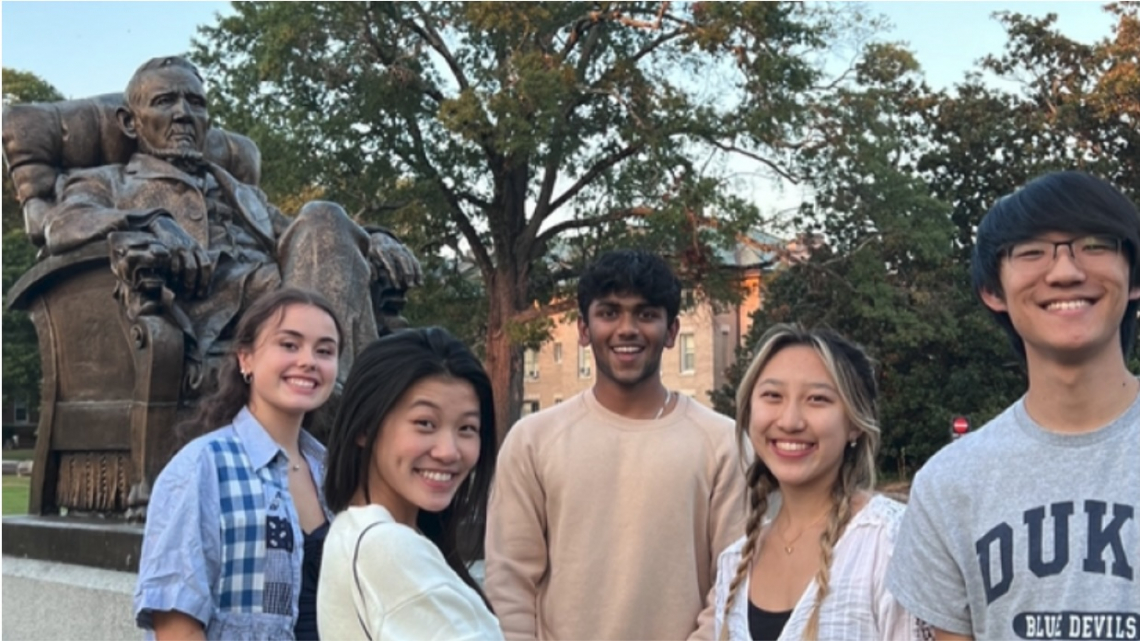
Margo Lakin, Trinity Communications
Collaboration is key at Duke, and the FOCUS Program has guided interdisciplinary partnerships among our diverse academic units for over 30 years. Recognized by experts such as educational psychologist Howard Gardner as a model of transformational education in the United States [1], FOCUS provides incoming students with experiential learning experiences as they begin their distinctive college paths.
In the late 1980s, Richard A. White, then Dean of Trinity College, was wrestling with an idea for a transformational learning experience for Trinity’s first-year students. He envisioned a small group-learning environment where a common theme could be explored through multiple disciplines.
White, now the University Distinguished Service Professor Emeritus of Botany, modeled his prototype on two offerings at Duke: The Twentieth Century American Program (TCAP) and the Freshman Seminar Program (FSP). Now defunct, TCAP helped undergraduates explore modern American society through the lens of history, literature, sociology, religion and political thought. FSP, today’s First-Year Seminars, was launched to enrich both the first-year experience and student-faculty interactions.
“Because our students come to Duke from many different backgrounds, I wanted to focus on one topic and try exploring it from several sides,” explains White, Emeritus Dean of Trinity College. “I believed then, and still do now, that those intimate and unintimidating group experiences would be an effective learning model, distinguishing Duke from some of our competitive institutions.”
In 1989, White formally proposed the creation of the FOCUS program, and secured funding the following year with a $25,000 Sears-Roebuck Foundation grant. FOCUS (First-year Opportunity for Comprehensive, Unified Study) officially launched in 1991 with four clusters: TCAP; Science, Technology and Modern Culture; Twentieth Century Non-Western Culture and Evolution and Humankind.
This Fall, Duke welcomes the 33rd FOCUS cohort, thanks to the monumental work done by a small but mighty team of three: Edna Andrews, director of FOCUS since 2011 and the Nancy and Jeffrey Marcus Humanities Distinguished Professor of Slavic and Eurasian Studies; Assistant Director Yana Lowry and Denise Stratton, senior program coordinator.
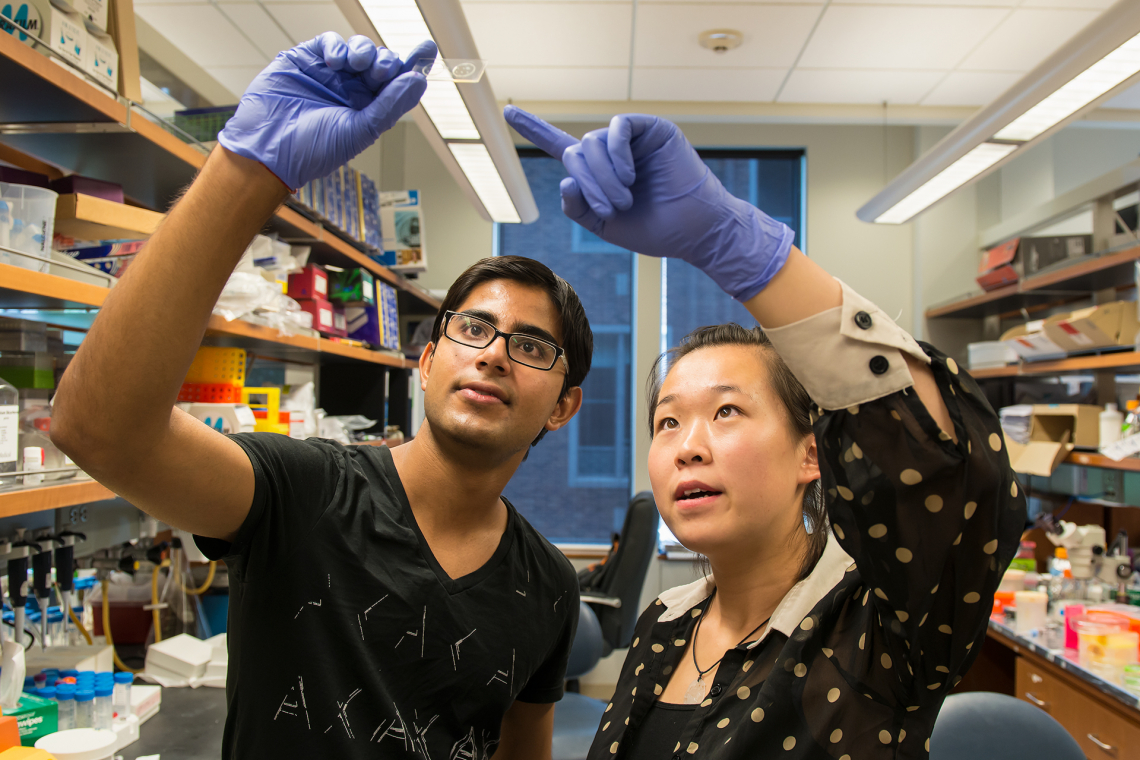
The program has grown to 18 clusters, and incoming students apply via a rolling admissions cycle which opens annually on February 1 and closes on May 25. Selecting a mandatory four possible clusters, notification arrives typically within two weeks of submitting materials.
“We have over 500 students applying each year,” Stratton shares. “That’s roughly one-third of the incoming class, and we’re able to place all of them — but the earlier they apply, the more choices they’ll have.”
Linked by themes, clusters contain two to four courses with a maximum of 18 students per course. Seminars are taught by regular rank faculty from departments and colleges across campus, and students take two courses from different departments within their cluster — courses which also fulfill Duke’s general education requirements. One to two FOCUS cohorts reside in each of the dorms on East Campus, forming bonds outside of the classroom while also connecting with non-FOCUS peers.
“There might be 300 people in a specific dorm, but only 36 of those students share a FOCUS group — and they aren’t necessarily roommates,” Lowry explains. “While there’s a sense of community among the cohort, the students still have the experience of living with 264 other people.”
The sense of community doesn’t stop with the students. Cluster faculty join them for a weekly communal meal, often with a guest speaker, where the small faculty-to-student ratio allows for more personal interactions.
Along with seminars, clusters may have a built-in travel component. There could also be a service-learning component, where students apply theoretical knowledge learned in the classroom to real-world situations. For example, Knowledge in the Service of Society has been involved in the North Carolina school system since the cluster’s inception.
“I characterize FOCUS as a transformative living-learning community, with an immediate introduction to interdisciplinary studies,” Andrews, the program’s director, explains. “First-year students start on the right foot, becoming part of a cohort where they gain the knowledge, experiences and human connections that put them in a much stronger position as they navigate through Duke.”
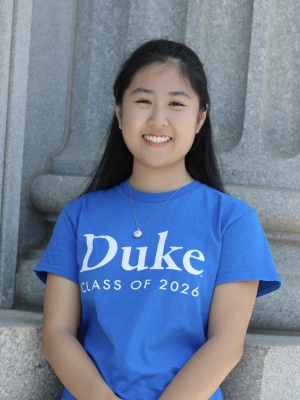
For sophomore Carolyn Chen, FOCUS made the transition from high school to college less stressful. Living in a dorm with fellow FOCUS students helped her develop peer connections much faster, and her seminar classes in the Cognitive Neuroscience and Law cluster provided a view beyond her textbook.
“From the beginning, FOCUS created these tighter academic communities that made me more confident and comfortable coming to such an academically rigorous university,” she shares. “Because of my small classes, I had direct connections with my professors, which resulted in really engaging conversations and mentorships.”
As the undergraduate’s journey through Duke continues, she’s still discovering unexpected bonuses from her time in the program. Chen learned to build effective college study habits that she still maintains, as well as a healthy schedule balancing studying, eating, personal time and even sleeping. Learning in small groups, rather than cavernous lecture halls, also forced her to commit to her FOCUS courses.
“I found that I stayed on top of my work and really held myself accountable in the program,” she says. “It’s easy to fall through the cracks and disappear in a large lecture hall — not so much in a small group.”
While FOCUS helps students acclimate to their first year at Duke, it can also serve as a litmus test to help them decide whether to pursue a course of study that might have looked “college-y” in the high school guidance office but isn’t the direction they want to take at Duke.
“Students come to Duke with a very specific trajectory in mind and tend to have already decided their entire lives,” Andrews shares. “One of the things FOCUS does is to show students that maybe the world they encountered in high school doesn’t look like the one that’s coming.”
Graduating from Duke with a B.A. in English, Camey VanSant, senior assistant director of Undergraduate Admissions, credits the English course in her FOCUS cluster, Visions of Freedom (not offered in 2024), for changing her academic trajectory.
“I came to Duke originally thinking of pursuing Public Policy or Political Science, and the cluster I selected was the obvious choice for those potential majors,” she explains. “At the time, if I had to write a list of the top five majors that I thought I’d end up in, English would not have made the cut.”
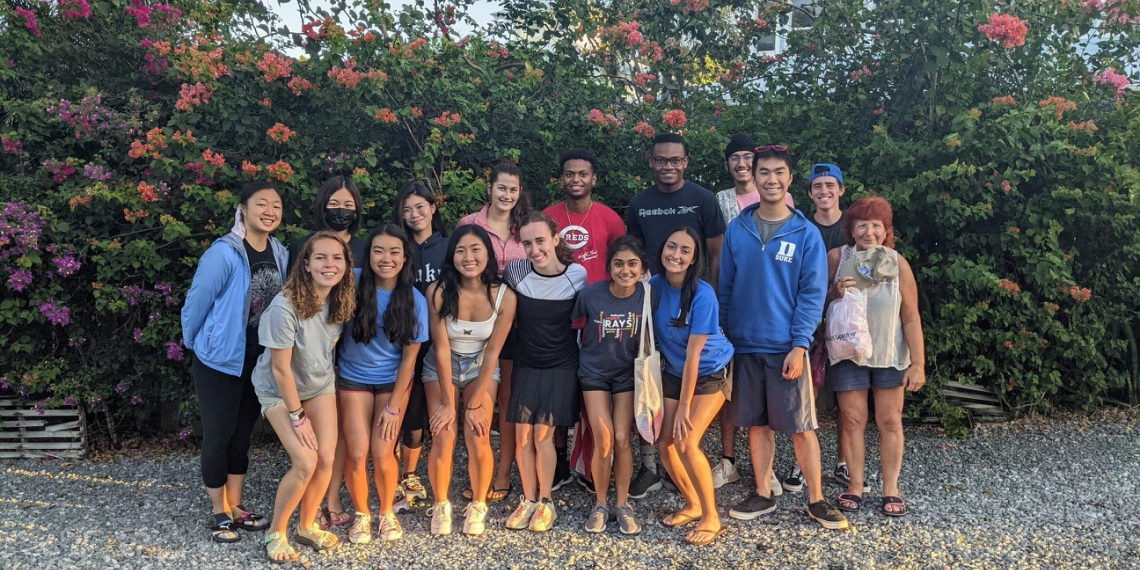
A strong advocate for FOCUS, VanSant understands the importance of the program’s interdisciplinary model that encourages students to see how scholars in different fields approach a particular theme, while challenging some of the beliefs they brought with them to campus.
“Students are at Duke to earn a degree and prepare for careers, but college is also about learning to think and write in different ways that will help make sense of the world,” she says. “Because FOCUS invites students to engage with a question from different perspectives, our first-year students start on a track of deeply thinking about themes and how people with different approaches can illuminate those themes.”
FOCUS can help students realize, as VanSant did, that a different course of study could be a better fit — and that’s okay. The program can also confirm a student’s initial academic path of interest, serving as an entryway into their research, peer groups and faculty mentors.
For junior Jaeden Toy, his FOCUS cluster introduced him to peers on a different career path. So how did the Computer Science and Russian double major fit in with his medicine- and law-focused cluster?
“It was actually informative to be surrounded by pre-med and pre-law students sharing stories about their non-FOCUS courses,” he admits. “The academic and intellectual aspects of FOCUS extended beyond my interests, and the built-in community really helped me to acclimate and adjust during my first semester at Duke.
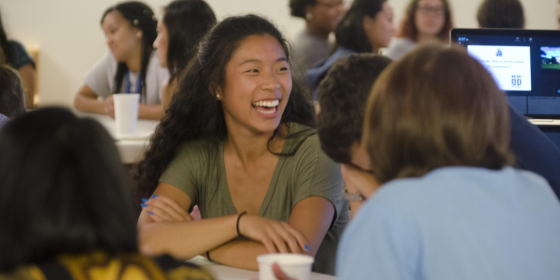
“Being in the FOCUS program opens your mind to different ways of thinking — and opens doors to so many student groups, new majors and friends.”
Although Andrews, Lowry and Stratton are clearly the three-person engine driving FOCUS, they are always quick to credit the faculty for the program’s success. Each year brings over 60 faculty to the program, and faculty-driven proposals for new clusters are regularly generated based on their enthusiasm and intellectual pursuits.
“The faculty who participate have an absolute passion for the subjects they teach and a dedication to providing our students with the absolute best in a liberal arts education,” Andrews explains. “No one teaches a FOCUS cluster because someone made them.”
1. Howard Gardner, The Real World of College: What Higher Education Is and What It Can Be (The MIT Press, 2023), 262; 357.